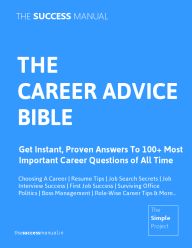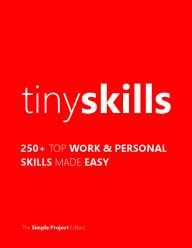On February 16, 2025 By thesuccessmanual Topic: Remarkable, Howto, Simpleguide
An expert is "an ordinary fellow from another town. - Mark Twain
This guide belongs to 100 Ways To Be Being Remarkable Series, a special project that brings you business and self-development advice from The Success Manual.
Who is an expert?
The Wikipedia describes an expert as:
Relative to a specific field, an expert has:
Specific education, training, and knowledge
Required qualifications
Ability to assess importance in work-related situations
Capability to improve themselves
Intuition
Self-assurance and confidence in their knowledge
Church Tech Matters.com delineates 3 levels to being an expert: Dropout -> Amateur -> Expert.
Why be an expert?
In this age of blogging and social media, much is being of authority. An authority blogger like Darren Rowse will get more people to his Problogger.net blog because he focuses on helping his readers become good bloggers and over time, he became the authority.
The point is: being an expert doesn't mean those scientists in their white coats. If you can help your readers or customers by making hard things easy to do, you have become an expert, an authority and today there are more avenues for you to benefit from your position. You can establish yourself as an industry expert using social media tools, blogging, events (conferences, workshops) etc. where you offer step-by-step guides, courses, consulting duties, training videos, screencasts, customer tips & tricks and formulating new ideas via blog posts and presentations.
Being an expert is good. [Also read step #4 below]
To punish me for my contempt for authority, fate made me an authority myself. - Albert Einstein
Here is simple guide to becoming an expert in 4 steps.
1. Put in your 10000 hours
According to Malcolm Gladwell as well as the analysis theory, it takes 10,000 hours to be an expert or elite performer, in any industry, science and art form.
Ten thousand hours is equivalent to roughly three hours a day, or 20 hours a week, of practice over 10 years.
That is why it is also sometimes referred to as the Ten-year rule.
Are you up to that?
2. Do the difficult stuff in your field
K. Anders Ericsson, Neil Charness, Paul J. Feltovich and Robert R. Hoffman, editors of The Cambridge Handbook of Expertise and Expert Performance say that 'doing something for ten years - in other words, having lots of experience - is not enough to become an expert performer.'
Kathy Sierra says,
Most of us want to practice the things we are already good at, and avoid the things we suck at. We stay average or intermediate amateurs forever.
What must we do then? The Cambridge Handbook of Expertise and Expert Performance says,
What is required is "deliberate practice", namely concentrated effort at improvement.
An amateur musician, for example, may have lots of experience playing through pieces, but a high-level professional will spend untold hours practising ever-more-difficult pieces, striving to master them.
3. Teach.
Brian Clark of Copyblogger says that 'In order to learn, teach'.
You can study for decades and not learn what you can by teaching for a month or two. Just remember to be honest about your skill and experience level, and you’ll find the right students for you.
You start by teaching the folks who know absolutely nothing and do not know how to find the basics for themselves. (Or who just don’t want to.) Teach the tried-and-true.
As you teach, you will find that the “simple stuff” gains a new depth and richness. You’ll start to see things about your topic that you never did before. Moreover, as you keep learning, you’ll be able to teach more and more sophisticated students.
Before you know it, you’re a guru.
4. It is never too late to start
Did you know actor Geena Davis, of "Thelma and Louis" fame almost qualified for the US Olympic archery teamShe took the sport 3 years before going in for the trials, when she was 40 years old. You can say that archery does not require rigorous physical stamina but you get the idea.
Kathy Sierra writes that we can create new brain cells by learning new things, even if we are past 30 years of age. This phenomenom is known as Neurogenesis. Thus, it is never too late to start learning that thing you always wanted to do when you were a child. Just your next 10 years, perhaps?
Related idea: Four stages of competence
Linda Adams first set out the idea of four stages of competence.
1. Unconscious incompetence
The individual neither understands nor knows how to do something, nor recognizes the deficit, nor has a desire to address it.
2. Conscious incompetence
Though the individual does not understand or know how to do something, he or she does recognize the deficit, without yet addressing it.
3. Conscious competence
The individual understands or knows how to do something. However, demonstrating the skill or knowledge requires a great deal of consciousness or concentration.
4. Unconscious competence
The individual has had so much practice with a skill that it becomes "second nature and can be performed easily (often without concentrating too deeply). He or she may or may not be able teach it to others, depending upon how and when it was learned.
If you liked this article, please bookmark it on Delicious or share on Twitter. Thanks, friends. Follow us on Twitter. | Get Updates To This Blog Via RSS
We don't recommend any other guide than our very own The Success Manual - Encyclopedia of advice to 130 most important skills.

